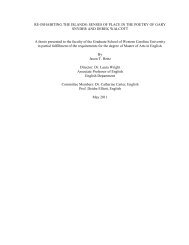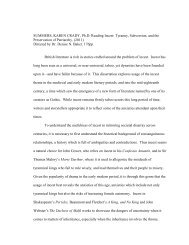CHUNG, SOONKYU, Ph. D. Mechanisms by Which Conjugated ...
CHUNG, SOONKYU, Ph. D. Mechanisms by Which Conjugated ...
CHUNG, SOONKYU, Ph. D. Mechanisms by Which Conjugated ...
You also want an ePaper? Increase the reach of your titles
YUMPU automatically turns print PDFs into web optimized ePapers that Google loves.
attenuation of insulin sensitivity in AD50 model is due, at least in part, <strong>by</strong> the<br />
suppression of adiponectin expression. Consistent with this notion, LPS administration to<br />
cultures containing almost exclusively adipocytes (AD90) did not adversely affect<br />
insulin-stimulated glucose uptake (Fig 4.5) or adiponectin gene expression (data not<br />
shown). Ajuwon and Spurlock (2005a) reported direct induction of PPARγ <strong>by</strong><br />
adiponectin, coupled with suppression of NFκB activation, suggesting mutual<br />
transcriptional activation of PPARγ and adiponectin may determine adipocyte<br />
susceptibility to inflammatory stimuli.<br />
The PPAR subfamily of nuclear receptors controls many different target genes<br />
involved in both lipid metabolism and glucose homeostasis. Loss of function, PPARγ<br />
mutations in humans cause insulin resistance (Zhang et al. 2004; Freedman et al 2005;<br />
reviewed in Hegele 2005), and activation of PPARγ <strong>by</strong> thiazolidinediones act as insulin<br />
sensitizers (reviewed in Yki-Jarvinen 2004). However, detailed mechanisms describing<br />
how inflammation suppresses PPARγ activity in human WAT are unclear. In our study,<br />
LPS suppressed ligand-induced, but not basal, PPARγ activity. Similarly, the PPARγ<br />
antagonist GW9662 decreased ligand-dependent, but not basal, PPARγ activity (our<br />
unpublished data), implicating ligand-inducible PPARγ activity is critical in regulating<br />
insulin sensitivity.<br />
One of the putative mechanisms modulating PPARγ activity is phosphorylation. It<br />
has been suggested that phosphorylation of PPARγ 1) impairs PPARγ affinity for its<br />
ligand (Shao et al. 1998), 2) controls interactions between PPARs and corepressors<br />
and/or coactivators of transcription (Guan et al. 2005), or 3) alters PPARγ binding to the<br />
122

















